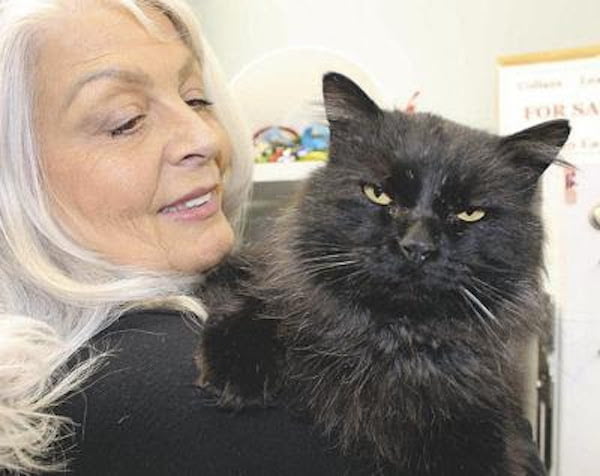Can FIV-positive cats go outside? The question is a moral one and it is asking whether it is sensible to allow a FIV-positive cat to go outside where they might transmit the disease to other cats. The answer is that it is not sensible or moral to do so although it is quite hard to transmit this disease. It is agreed that the most likely form of transmission is through male cats fighting. When they bite each other their saliva is injected into the other cat. The saliva carries the disease.
 |
| Deborah Bell, former Carthage Humane Society executive director, holds Fritz, an FIV-positive cat featured in a Globe pet column. Photo: Globe | Kevin McClintock |
It is further believed that about 2 to 4% of cats in the general population in America are affected by the disease. The incidence is highest in male cats in the age range 3 to 5 roaming outside. These are normally indoor/outdoor cats or outdoor cats. They get into fights with other male cats over territory.
I remember feeding a male cat, Timmy, who regularly visited me many years ago. He was not neutered and he was a classic example of the sort of domestic cat who could transmit the disease. I don't know whether he had the disease but I do know that he had an abscess at one time which we had to fix by taking him to a veterinarian. It highlighted the frequency at which non-neutered male cats, who are quite young, get into fights.
 |
| Photo: MikeB |
Close contact between cats is not a major mode of transmission according to my veterinary handbook. And it can't be transmitted by mating, apparently. Boarding catteries take FIV-positive cats normally as far as I know. This is because the cats are separated and there's no chance of contact. And standard disinfectants kills the virus.
It would seem that the prime danger for a FIV-positive cat in a boarding cattery is to that cat rather than to the other cats. This is because they have a weakened immune system and therefore if other cats in the boarding cattery are carrying a disease that FIV-positive cat is more likely to get it.
The best course of action is to allow FIV-positive cat to roam outside in an enclosure attached to the house but this won't suit many people. Or they can stay indoors all the time but it is advised that they do not live with other cats. They deserve a good life nonetheless. They make great pets like any other companion animal.
There is no effective treatment for FIV which by the way stands for feline immunodeficiency virus. FIV-positive cats require high quality routine care combined with excellent nutrition, parasite control and minimising stress.




